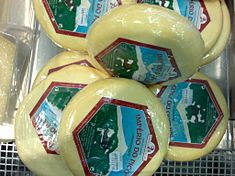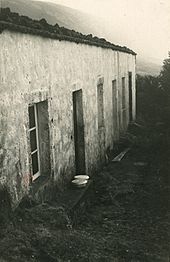Queijo do Pico facts for kids
Quick facts for kids Cheese of Pico |
|
|---|---|
 |
|
| Other names | Queijo do Pico |
| Country of origin | |
| Region | |
| Town | Lajes do Pico, Madalena, São Roque do Pico |
| Source of milk | Cows |
| Pasteurised | No |
| Texture | Soft |
| Fat content | 45-49 |
| Aging time | 20-30 days |
| Certification | PDO October 1996 |
| Named after | Lua error in Module:Wikidata at line 70: attempt to index field 'wikibase' (a nil value). |
Cheese of Pico (called Queijo do Pico in Portuguese) is a special type of cheese. It comes from Pico Island in the Azores, a group of islands that belong to Portugal. This cheese has a special status called "Protected Designation of Origin" (PDO). This means it's officially recognized as coming only from Pico Island. The European Union gave it this special title in October 1996.
Contents
History of Pico Cheese
People don't know exactly when Queijo do Pico was first made. But we know it's been around for a very long time! There are records of it being made as far back as the late 1700s. The way this cheese is made has been passed down through families for generations.
What Makes Pico Cheese Special?
This unique cheese is made from cow's milk. It goes through a slow process to become cheese, which takes about 20 to 30 days.
Shape and Size
Pico cheese is shaped like a cylinder. It is usually about 16 to 17 centimeters (6 to 7 inches) wide. The height of the cheese is about 2 to 3 centimeters (less than 2 inches). Each cheese usually weighs between 650 and 800 grams (about 1.4 to 1.7 pounds).
Texture and Taste
When the cheese is ready, it has a yellow, bumpy crust on the outside. Inside, it's yellowish-white, soft, and a bit gooey. Pico cheese has a salty taste and a strong, unique smell. It is also known for being a fatty cheese, with about 45% to 49% fat content.
See also
 In Spanish: Queijo do Pico para niños
In Spanish: Queijo do Pico para niños
 | Leon Lynch |
 | Milton P. Webster |
 | Ferdinand Smith |


